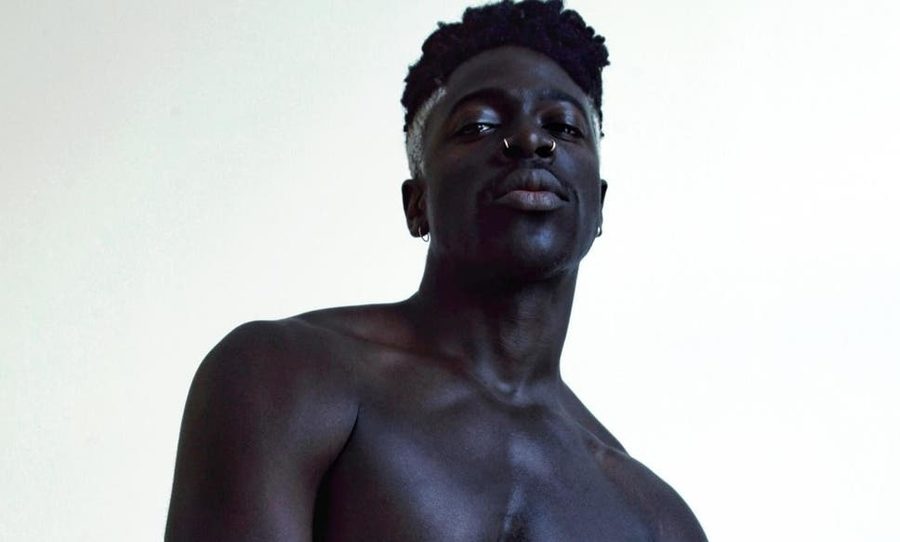On his second album, Moses Sumney offers a sprawling study of identity, examining his own experience of race, gender, relationships, experience, and existence.
Encased in a sonic landscape which is as equally malleable and far-reaching, græ offers a truly gripping ride, peering between the confines of black and white, male and female, monogamy and polyamory, truth and lies, and life and death, searching for something human in the space between.

On græ, Moses Sumney eschews the limits of categorisation to prove that there is a triumph to be found in the multifaceted nature of being.
The release of græ was divided into two parts, with the first, græ: Part 1, dropped in February of this year, and the second released on Friday. As a body of work, the 20-track album feels very much like a sonic epic – both musically and conceptually. Sumney has described how the idea of breaking the album into two parts came from wanting the album’s release to be as experimental as the album itself.
The album begins with the 47-second spoken word track insula, which offers up some of the ideas fundamental to the album, although it isn’t until later that we completely grasp their gravity. British author Taiye Selasi can be heard narrating the repeated line, “Isolation comes from “insula” which means island.” The track ends with the caution: “Here we go into the grey.”
The first full-length track is Cut Me, a song which traces the inherent masochism of the belief that pain is a necessary part of progress: “When I’m weary/And so worn out/…That’s when I feel the most alive/Masochistic kisses are how I thrive/…if there’s no pain/(Is) there any progress?/…Endurance is the source of my pride.”
It’s a philosophy that Sumney holds with pride – perhaps, as he suggests, one which originates from his immigrant background: “Guess I’m a true immigrant son/No vacancies, no vacations/Sure, I could do better than this/But I don’t, I won’t, I don’t.”
It’s no secret that Sumney does not accept R&B label that has so readily been bestowed upon him. Speaking in an interview with Rolling Stone, the singer describes how Cut Me was his way of subverting soul revivalism:
“On “Cut Me,” I wanted to say, like, if I were to make a soul revivalism bid, this is what it would be, and it would be fucked up,” Sumney expresses. “It would be talking about pain and weariness in the way that gospel does, but it would be embracing that pain and saying, ‘No, cut me. I’m a masochist.’ It would have this weird BDSM angle.”
It’s fitting also, that an album so focused on the painstaking examination of categorisations (and the entailing refusal to accept any easy answer) would begin with a song about pain. There is nothing simple about Sumney’s approach to understanding the world. Instead, it’s about the beauty that comes with continual questioning.
The first part of the album feels more focused on external matters. On the soulful In Bloom Sumney seemingly sings of a relationship in which the narrator’s feelings are not returned. “‘Cause I’ve held you in place/Of a wife, in the space/A spouse would hold,” he laments, only for the other person to “sig[h] BFF.” Sumney wonders: “I hope you’re not another supplement/For absent relationships.”
And yet, despite the fact that this person does not assume the label of a partner, by the end of the song they find a way to connect, labels aside: “As the night becomes dawn/You and I become one/You take my face in palm/And call me the morning sun.”
On Polly, Sumney explores similar territory, seemingly describing the tension between two people who are monogamous and polyamorous, respectively: “If I split my body into two men/Would you then love me better?” Whilst on Virile Sumney critiques masculinity: “You’ve got the wrong guy/You wanna slip right in/Amp up the masculine/You’ve got the wrong idea, son/Dear son/We pick our own prisons.”
Sumney’s deliberations take an existential turn with the urgent Conveyor, singing of the “uniform assembly” of society: “I will assume form, join the workforce, the colony.” The track, punctuated by rhythmic synth and guitar stabs, demonstrates Sumney’s breathtaking ability to harness scope, tracing an existential conveyor belt all the way from the diminutive realm of fire ants right through to human society. Everything is equal: “The fire ants die for a chance at the queen,” he sings.“The carpenter bee dies when he finally leaves a sting/…I will step on the belt, put my life on the shelf, one of many.”
The track gracefully transitions to boxes, where we see the return of spoken word, this time Selasi is joined by Ayesha K. Faines, Ezra Miller, and Michael Chabon. “We are constructing a whole new edifice of boxes to put people in/To protect a space inside which you can exist,” the voices describe. And then, perhaps most importantly: “I truly believe that people who define you control you/And the most significant thing that any person can do/But especially black women and men/Is to think about who gave them their definitions/And rewrite those definition for themselves.”

The second half of the album seems to signal a more introspective turn. On the slow-burning, synth-driven Two Dogs, Sumney recalls a story about two dogs who, “medicine clogged”, died on the back porch. “Strange how what heals can also kill,” Sumney reflects, his poetry perhaps most potent in moments when he invests in the power of a single image. And then, effortlessly, he stretches the world of the song wide open, bringing it back to a present-day conversation where he reflects how the incident is “The type of shit a child forgets/But the memory resets/When you ask me in a worried fret/’Have you ever at least loved a pet?'”
On Bystanders, Sumney again invokes the dilemma of binaries which so heavily permeates the album: “What’s the use of confessing the truth/To an executioner in a booth/About the dueling forces in you?” And later: “Morality is grey.” Whilst on Keeps Me Alive, Sumney confesses, “Childlike curiosity about my fate/Is the only thing/That makes me stay.”
Yet for all its questioning, the album perhaps comes full circle on the spoken word track and so I come to isolation, where Selasi’s voiceover from the opening returns. “And so I come to isolation,” the track begins. “Etymologically, isolation comes from “insula,” which means island/I-so-la-tion, isolation, which literally means to be islanded,” Selasi describes. “And I thought, that’s exactly what I’ve been my whole life/I’ve been islanded.”
If græ could be distilled into a single question, it would be this: what does it mean to live without categorisation? Throughout history, we have engaged in acts of compartmentalisation as a means to understand the world. Yet the further we move away from our past, the more these ways of dividing the world feel uncomfortable in their attempts to encompass the multiplicity of being. Perhaps we are all islands, and that is something that should be celebrated.
græ is out now on all platforms, grab your copy here.



